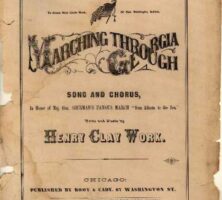“Marching through Georgia” is one of the best-known songs of the Civil War (1861-65). Composed by Henry Clay Work and published soon after the war ended in 1865, it commemorates Union general William T. Sherman’s march from Atlanta to Savannah in the fall of 1864. The song became very popular in the North and sold more than 500,000 copies in the first twelve years after its publication.

Work, a Connecticut native living in Chicago, Illinois, when the war broke out, was a printer by trade as well as a self-taught musician. In 1861 he signed a contract to produce sheet music for Root and Cady, a Chicago publishing firm. The firm’s George F. Root was himself a well-known composer of popular music and Civil War songs.
“Marching through Georgia” is a five-stanza song with a recurring chorus and was published with a piano accompaniment. Like many Civil War songs, it served as a rallying cry for the North, even though the song did not appear until after the war had ended. Some historians have attributed the song’s popularity to its morale-boosting effect as a celebration of the triumphant end of the war. As a testament to freedom and sacrifice, its inspirational lyrics also contain a comic undertone.
The first stanza calls for the rallying of the troops with the bugle call. The second stanza claims that sweet potatoes popped out of the ground as the “Yankees” approached. The third stanza is a nostalgic account of the Union soldiers as they see their flag raised. In the fourth stanza, the comedic tone returns with reference to “saucy rebels” who did not think the Northern troops could reach the coast. The final stanza describes the 300-mile-long march to the sea, in which the Union army, in a 60-mile-wide column, “made a thoroughfare for freedom and her train.” The chorus is written in four-part harmony for soprano, alto, tenor, and bass, to be performed by a group of people in response to a soloist singing the stanzas.
While this song remained quite popular in the North and became a standard at veterans’ reunions and political rallies, Sherman did not like it and once stated that “if I had thought when I made that march that it would have inspired any one to compose the piece, I would have marched around the state.”
“Marching through Georgia” became a popular tune for parade bands and inspired later composers, including Charles Ives. In Ives’s early-twentieth-century composition for orchestra Three Places in New England, the first movement, “The 'St. Gaudens’ in Boston Common,” features a medley that interweaves Work’s tune with Root’s “Battle Cry of Freedom” and an old plantation song, “Old Black Joe.” “Marching through Georgia” remains a recognizable song. It may be heard in the film Gone With the Wind (1939) and was used by Ken Burns in his documentary The Civil War (1990). Princeton University, in Princeton, New Jersey, once adopted the tune as its football fight song.
The song’s lyrics are as follows:
Ring the good ol’ bugle, boys, we’ll sing another song,
Sing it with the spirit that will start the world along,
Sing it as we used to sing it 50,000 strong
While we were marching through Georgia.
[Chorus]: Hurrah, hurrah, we bring the jubilee!
Hurrah, hurrah, the flag that makes you free!
So we sang the chorus from Atlanta to the sea
While we were marching through Georgia!
How the darkies shouted when they heard the joyful sound!
How the turkeys gobbled which our commissary found!
How the sweet potatoes even started from the ground
While we were marching through Georgia! [Chorus]
Yes, and there were Union men who wept with joyful tears
When they saw the honored flag they had not seen for years.
Hardly could they be restrained from breaking forth in cheers
While we were marching through Georgia! [Chorus]
“Sherman’s dashing Yankee boys will never reach the coast!”
So the saucy rebels said, and ’twas a handsome boast,
Had they not forgot, alas, to reckon with the host
While we were marching through Georgia! [Chorus]
So we made a thoroughfare for freedom and her train,
Sixty miles in latitude, 300 to the main.
Treason fled before us, for resistance was in vain
While we were marching through Georgia! [Chorus]





